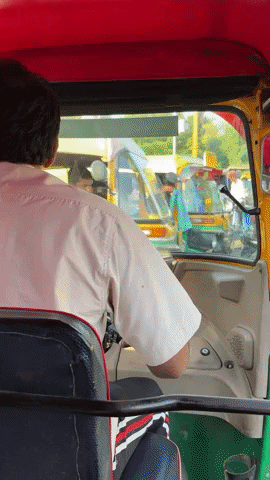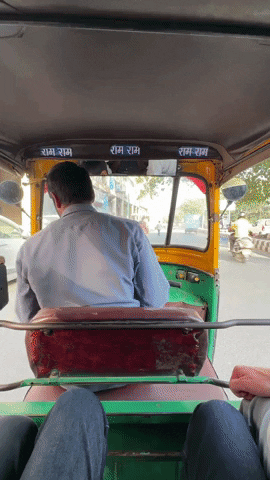And it was totally worth it
I knew my trip to India was going to get weird when I got a stomach bug before I landed at Indira Gandhi International Airport. Frankly, it was a win to cross that distance without causing an international incident in the airplane lavatory. But I made it. I would be in New Delhi for ten days, working with Indian startup founders at the U.S. Embassy’s Nexus Program. The first day was a hit. The founders are excited and engaged and the week is shaping up swimmingly.
My colleague Alan and I exit the venue and take a moment to figure out what to do for the rest of the afternoon.
“I could use a beer,” I offer. Alan nods. With timing that feels like fate, a spry white-haired gentleman almost magically appears in front of us and asks if we need anything.
Listen, neither Alan nor I am an idiot. We know we are inviting chaos. But what can I say? I was feeling lucky.
“Can you point us in the direction of a beer?”
“I can help you sir,” said the gentleman with a confident assuredness and the head shake that means no to Americans but yes to Indians. Through a couple of glances, Alan and I are able to communicate a) this might go somewhere weird and b) we’re ok with it. So we proceed.
“Come with me,” he says. So we start walking.
His name is Vinod. He was about to meet his cousin but the beer place he will take us to is on the way. He works with an organization he describes as “kind of like an NGO” but refuses to elaborate further on why it’s not exactly an NGO or what they even do.
On the way, he introduces us to his cousin. Perhaps the cousin knows where the beer is? We shake hands. The four of us start walking. Within seconds, the cousin disappears into the crowd.
Thirty feet later, we get into the first tuk tuk of the day. Tuk tuks, also known as auto-rickshaws, are cute three wheeled carts that cruise around Asian cities. Five minutes later, I find myself impressed that they maintain their cuteness even when fighting for space against vehicles three times their size.
Indian drivers may be the best drivers in the world; their cars are an extension of themselves. They have a cell-deep spatial awareness of every inch of their vehicle. Our tuk tuk driver is masterfully sliding in and out of spaces open for milliseconds. While I’m starting to doubt Vinod’s ability to lead us to a beer, I have 100% confidence in this driver’s ability to shoehorn his way into the only open space on the road. Tuk Tuks and taxicabs are like birds in a flock rather than machines, and our bird moved with mechanical grace.

That is, until the tuk tuk fails. The engine dies while trying to outpace a bus. The driver turns the engine so many times it is clear the tuk tuk is grounded.

We get out and start walking. “Vinod, where is the beer place?” It’s close, he tells me. At this point, we have driven halfway across town into Old Delhi, which is louder, rougher, and dirtier than where we came from. It smells like exhaust and the kind of pollution that doesn’t have a name. People sleeping on traffic medians. Street children tapping on car windows. Cows—sacred and untouchable—doing what they please.
We get into a different tuk tuk and continue across town. Five minutes later, we reach a busy intersection where two gentlemen are having a conversation. Vinod interrupts. “Where the fuck is the beer store?” he probably demands in Hindi. (Confirmed: he never knew where it was in the first place). After what seemed far too long to reveal simple directions, we start walking down a side street. Finally, we see a beer shop.
There is a loose assemblage of people in front of the counter. Calling it a line would be a stretch, but it’s clear everyone is waiting for service. Vinod has other ideas. He forces himself to the front of the counter and starts barking at the shop clerk, who is himself in the middle of shouting with another customer.
They have a high-volume exchange. Many words. Many decibels. I weave my way up front next to Vinod to see what’s happening. He is trying to make sure the beer is cold. Which is puzzling. We can plainly see the beer in the glass coolers lining the back wall of the shop. After Vinod is satisfied, Alan pays. The clerk hands me a four pack of warm beer. Sigh. That’s what I get for assuming the refrigerator was turned on.
But Vinod is not one to give up. He leads us to a different storefront to buy ice. The clerk fills a black trash bag with ice. The final scoop comes from the floor. Mostly ice with a few grains of concrete and dust for good measure.
We start walking down the street towards Red Fort, a Delhi landmark. We had not known we were visiting a tourist site, but hey, sounds cool. Vinod says we can enjoy a beer there. I ask Vinod if it’s kosher to drink a beer at a tourist site and he assures me this is fine.
We arrive at the gate, which involves crossing through metal detectors that are not turned on (90% of the metal detectors I have walked through in India were non-functional). “Hide the beer,” Vinod warns me. Given the logic of the last hour, I stop asking questions and do what he says.
Vinod shares that he has a stomach problem and disappears. He is gone for a suspiciously long time. We sit on a curb and enjoy an extra-filthy Bad Monkey beer in front of the Red Fort, which is gorgeous. The view is excellent, the beer mediocre.
Vinod returns and we stroll for sixty seconds until he disappears again. We finish our beers and decide it’s time to leave. But we can’t find Vinod. We scan the crowd for his white patch of hair. No Vinod. As we walk towards the exit, we see a tuk tuk splitting the crowd like Moses parting the red sea. The driver is steady behind the wheel. Vinod hangs off the side like a Hollywood Bollywood stuntman.
Vinod was never missing; he was one step ahead of us all along. On the way home, we hit walls of traffic. Our tuk tuk barely moves. We wait for the same red light three times. And four times for the next red light. Everytime our tuk tuk stops, Vinod gets out and wanders through traffic on foot. He always seems to make it back to the vehicle when traffic starts to move.
Up to this point, Vinod rode in the backseat of the tuk tuk with us. As we approached the hotel, he shared a one-person seat with the driver. They whispered together in Hindi. He was not our tour guide anymore. He was a chessmaster moving his pieces into position.
Finally, we pull up to our hotel and it’s time to pay. The driver keeps silent while Vinod tells us the price. Why is the driver not telling us the price? 2400 rupees. How much is that? If you don’t know how much that is, neither did we. Then Vinod for his cut. He said he normally got paid in US dollars. 50 to be exact.
Alan says, “VINOD, I FEEL UNCOMFORTABLE” and hands him a thousand rupees. I hand him a five dollar bill. Vinod backed away slowly, gesturing that there is no problem. This was not Vinod accepting defeat; he was quitting while he was ahead.
As I write this story from my hotel room six days later, I took a regular tuk tuk ride—without Vinod—for 70 rupees. But I have to admit. This ride wasn’t as fun as the one with Vinod. Sometimes the best thing that can happen is someone taking you for a ride.
Get weekly tips on entrepreneurship, video, and shooting your shot in my newsletter: https://www.camhouser.com/newsletter
Thanks to early readers: Alan Hibbard, Monica Q. F. de Magalhaes
